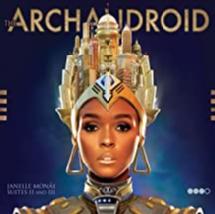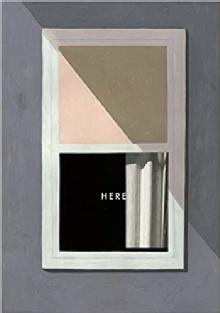Syllabus 2022-2023
Chris Kraus I Love DickLink opens in a new window, Serpent's Tail, 2016 [1997].
Jay Bernard. SurgeLink opens in a new window, Chatto & Windus, 2019.
Janelle Monae, The ArchAndroid, Wondaland Arts Society and Bad Boy Records, 2010.
Saadallah Wannous, Soiree for the 5th of JuneLink opens in a new window. Translated by Roger Allen. The Mercurian, Vol. 5, No. 2, Fall 2014 [1967].
Richard McGuire. Here,Link opens in a new window Pantheon Books, 2014 [1989].
Students are required to get the Kraus, Bernard, and McGuire (either by buying or borrowing them) and to access the Monae (whether via cd, vinyl, streaming service, etc..). Books can be read in either print or e-book format and can be obtained from various bookstores and platforms.
Students might also benefit from using the two critical companions, below, which can be purchased in hard copy or downloaded as e-copies via the library:
David Lodge and Nigel Wood. Modern Criticism and Theory: A ReaderLink opens in a new window. 3rd Ed., Routledge, 2013.
Groden, Michael, Martin Kreiswirth and Imre Szeman. Contemporary Literary and Cultural Theory: the Johns Hopkins GuideLink opens in a new window. Johns Hopkins University Press, 2012.
Term 1
Week 1: Introduction to the course (Dr. Myka Tucker-Abramson)
Unit I: Narrative
*** Text to read over the summer for this unit, Chris Kraus I Love Dick ***
Week 2: Structuralism and Structural Linguistics (Prof. Daniel Katz)
Ferdinand de Saussure, 'The Object of Linguistics'Link opens in a new window and 'Nature of the Linguistic Sign'Link opens in a new window and 'Linguistic Value'Link opens in a new window Course in General Linguistics. Translated by Wade Baskin, Columbia University Press, 2011 [1916], pp. 7-17; pp 65-70; pp 111-122.
Roman Jakobson 'Two Aspects of Language and Two Types of Aphasic DisturbancesLink opens in a new window.' Language in Literature, Edited by Krystyna Pomorska and Stephen Rudy, Harvard University Press, 1987 [1941], pp 96-114.
Week 3: Historical Materialism (Dr. Nick Lawrence)
Karl Marx. excerpt from 'The German IdeologyLink opens in a new window.' Modern Criticism and Theory, Edited by 1845], pp. 31-41.
Raymond Williams. 'LiteratureLink opens in a new window.' Marxism and Literature, Oxford University Press, 1978.
Week 4: Psychoanalysis (and Structuralism redux) (Dr. Myka Tucker-Abramson)
Sigmund Freud 'The Method of Interpreting Dreams: An Analysis of a Specimen DreamLink opens in a new window' The Interpretation of Dreams. Translated from the German and edited by James Strachey, Basic Books, 2010 [1899], pp. 121-145.
Louis Althusser 'Ideology and Ideological State ApparatusesLink opens in a new window' (excerpted) Lenin and Philosophy and Other Essays. Translated from the French by Ben Brewster, Monthly Review Books, 2001 [1970], pp. 159-186.
Week 5: Feminism (Dr. Rashmi Varma, and a visit from our subject librarian, Kate Courage)
Helene Cixous. 'Laugh of the MedusaLink opens in a new window' Signs, Vol. 1, No. 4, Summer, 1976, pp. 875-893.
Juliet Jacques. 'Écriture trans-féminine?Link opens in a new window' Mal, Vol. 1, November 2018.
Unit II: Poetics
Week 7: Comparative Poetry (Dr. Jonathan Skinner)
Mahmood Darwish "Sonnet V"; W.B. Yeats "No Second Troy"; Lorna Goodison "Mother, the Great Stones Got To Move"Link opens in a new window
Cleanth Brooks and Robert Penn Warren. 'Poetry as a Way of SayingLink opens in a new window.' Understanding Poetry. Holt Rinehart and Winston; 4th edition, 1976 [1938], pp. 1-16.
Week 8: Comparative Poetics (Dr. Jonathan Skinner)
Adonis. 'Poetics and ModernityLink opens in a new window.' An Introduction to Arab Poetics. Translated by Catherine Cobham, Sake, 2003 [1984], pp. 87-122.
Édouard Glissant. 'For Opacity.'Link opens in a new window Poetics of Relation. Translated by Betsy Wing, University of Minnesota Press, 1990, pp. 189-194.
Audre Lorde. 'Poetry is Not a LuxuryLink opens in a new window.' Sister Outsider, Penguin Books, 1984.
Week 9: Contemporary Poetics I (Dr. David Grundy)
Jay Bernard. Surge, Chatto & Windus, 2019.
Stephen Regan, 'The ElegyLink opens in a new window.' A Companion to Contemporary British and Irish poetry, ed. Wolfgang Görtschacher and David Malcolm, 2020, pp. 119-27.
Linton Kwesi Johnson "The New Cross Massacre: We Will Never ForgetLink opens in a new window" Here to Stay, Here to Fight: A Race Today Anthology (Pluto, 2019) [1986]
To watch: Linton Kwesi Johnson's 'New Crass MassakahLink opens in a new window' (1998)
If you have time, try to watch at least one episode of Steve McQueen's three-part documentary, UprisingLink opens in a new window, on the New Cross fire and its aftermath and have a look at Gabrielle Daniels' "When the Smoke Clears" (2020) and D.S. Marriott's "Another Burning" (2022)Link opens in a new window.
Week 10: Contemporary Poetics II (Prof. Emma Mason)
Janelle Monae, The ArchAndroid, Wondaland Arts Society and Bad Boy Records, 2010.
Selected poems by Langston Hughes, Frederico García Lorca, Allen Ginsberg, Gwendolyn Brooks, Amiri Baraka, Toi Derricotte, and Evie Shockley.Link opens in a new window
Donna Haraway, 'A Cyborg ManifestoLink opens in a new window.' Manifestly Haraway. University of Minnesota Press, 2016 [1985], pp. 5-90.
[Note: for "A Cyborg Manifesto, please focus on the following two sections. 1/ Pp. 8 (from "The cyborg is a creature in a postgender world') to pp, 10 ("Their fathers, after all, are inessential.") 2/ Pp. 33 (from "Communications technologies and biotechnologies are the crucial tools recrafting our bodies") to pp. 34 ("The fundamentals of this technology can be condensed into the metaphor C3 ....")]
Term 2
Unit III: Performance
*** Text to be read alongside material for weeks 1-3: Saadallah Wannous, Soiree for the 5th of JuneLink opens in a new window***
Please see this excellent overview of the play, "Critique After the 1967 Defeat" by Elizabeth Suzanne Kassab, that provides an introduction to both the author’s work as well as the larger context, namely, the June 1967 war.
Week 1: Semiotics of Theatre (Dr. Stephen Purcell)
Ric Knowles. "IntroductionLink opens in a new window" and "Chapter 2: TheatreLink opens in a new window" How Theatre Means. Palgrave Press, 2014, pp.1-10; 43-80.
Week 2: Modernist Approaches to Theatre (Dr. Matt Franks)
Antonin Artaud. 'The Theatre of Cruelty: First ManifestoLink opens in a new window' The Theatre and Its Double. Translated by Mary Caroline Richards, Grove Press, 1958 [1938], pp. 89-100.
Week 3: Theatre and Social Change (Dr. Stephen Purcell)
Augusto Boal. 'Preface to the 1974 Edition' and 'Poetics of the Oppressed.Link opens in a new window' Theatre of the Oppressed, Pluto Press, 2008 [1970], pp. 95-135.
Suggested further reading:
Saadallah Wannous "Manifestos for a New Arab TheatreLink opens in a new window" Alif: Journal of Comparative Poetics, 39, 2019, pp. 190-227.
Week 4: Gender and Performativity (Dr. Myka Tucker-Abramson)
Judith Butler. 'Performative Acts and Gender Constitution: An Essay in Phenomenology and Feminist Theory.Link opens in a new window' Theatre Journal, Vol. 40, No. 4. (Dec., 1988). 519-531.
Sylvia Federici. "Wages Against HouseworkLink opens in a new window." Falling Wall Press, 1975, pp. 1-8.
To watch: Martha Rosler "Semiotics of the KitchenLink opens in a new window" (1975) and Aisha Mizra "Fuck Me or Destroy Me, feat Haraam KaurLink opens in a new window" (2017) .
Suggested further reading:
Julia Serrano, "Introduction" and "Putting the Femme Back in Feminism"Link opens in a new window Whipping Girl: A Transsexual Woman on Sexism and the Scapegoating of Femininity, Seal Press, 2016 and "Julia Serrano on Judith ButlerLink opens in a new window" (2015)
Week 5: Performance and Racialisation (TBD)
To read: Frantz Fanon. 'The Fact of BlacknessLink opens in a new window' Black Skin White Masks. Translated by Charles Lam Markmann, Pluto Press [1952], pp. 82-108.
To listen to/watch: Kendrick Lamar, "Alright"Link opens in a new window (2015)
To watch and look at: Adrian Piper "Mythic Being" - videoLink opens in a new window and newspaper advertsLink opens in a new window (1972-1975)
Unit IV: Image
Week 7: Aura, Face, Photography (Dr. Diarmuid Costello)
To read: Walter Benjamin "A Short History of PhotographyLink opens in a new window" (1931).To look at: August Sander’s portraitsLink opens in a new window (1920s/30s), Eugene Atget’s images of ParisLink opens in a new window (late 1890s). and Bernd & Hilla Beche's typolographiesLink opens in a new window (1960s-1990s).
If you have time, also read Walter Benjamin's "The Work of Art in the Age of its Technical Reproducibility"Link opens in a new window [aka The Work of Art in the Age of Mechanical Reproduction’] (especially §§II-IV, VI) (1939) and "On Some Motifs in BaudelaireLink opens in a new window" (1940) (especially §XI), which are useful background reading.
Week 8 Spectacle: (Dr. Caitlin Vandertop)
To read: Guy Debord. 'Separation PerfectedLink opens in a new window' Society of the Spectacle. Translated by Black & Red, Radical America, 1970 [1967]), Paragraphs 1-35.
To watch: Xin Xin 'Foxconn.tv'Link opens in a new window (excerpt, 2015) and ipod ads and ipod ads culturejammed
Week 9: Graphic (Dr Tomos Hughs and Dr. Harry Warwick)
Richard McGuire. HereLink opens in a new window, Pantheon Books, 2014 [1989].
Andreas Malm. 'Introduction: Theory for the Warming ConditionLink opens in a new window.' The Progress of This Storm: on society and nature in a warming world. Verso, 2018, pp. 7-20.
Roy Scranton. 'Introduction: Coming HomeLink opens in a new window.' Learning to Die in the Anthropocene: reflections on the end of a civilisation, City Lights Press, 2015, pp. 8-14.
David Farrier and Aeon, 'How the Concept of Deep Time is Changing'Link opens in a new window The Atlantic, October 31, 2016.
Week 10: Digital (Dr. Justin Tackett)
Richard Seymour. 'We are all ConnectedLink opens in a new window" and "We are all ScripturientLink opens in a new window.' The Twittering Machine, Indigo Press, 2001, pp. 12-31; 141-154.
Assessment
The module is offered to first year undergraduates, Erasmus Mundus and exchange students as well as some honours level students. Assessment instructions and details of the various assessment patterns can be found hereLink opens in a new window.
Research Skills
A short research skills course, created with students, to help you with your assignments can be found here.
Also, you may want to watch the following short videos, in which English students give their views and their tips on research at university:
Researching for your assignments (2020-2021Link opens in a new windowLink opens in a new window)
Starting your research journey: a student viewLink opens in a new windowLink opens in a new window
Top tips for first year research: a student viewLink opens in a new windowLink opens in a new window
Teaching times
The first lecture for this module will take place at 10am on Thursday of week 1
Seminars start in week 2.
Learning outcomes
By the end of the module students should be able to
- Discuss a particular work of literature or culture in relation to a variety of theoretical questions and optics
- Engage more confidently in critical analysis and bibliographic research relating to works of modern literature and culture
- Participate in discussions regarding the role of literature in society, questions of institutional authority and contemporary cultural debates
- Be prepared to progress into the level 5 theory module, ‘Literature in Theory’ - English Literature Q300 students only
- Make an informed choice of honours-level pathways and specialised options in modern literary topics; have completed training in Research Skills




